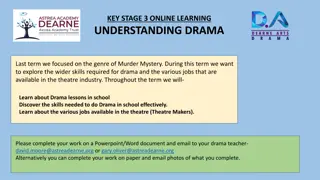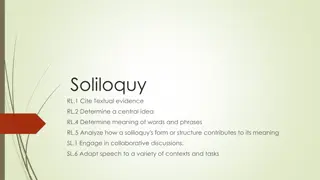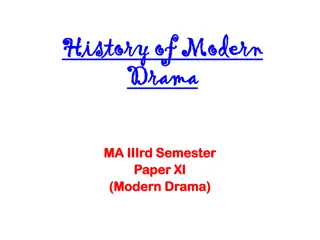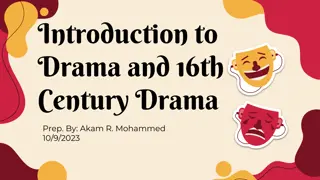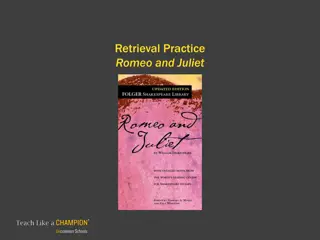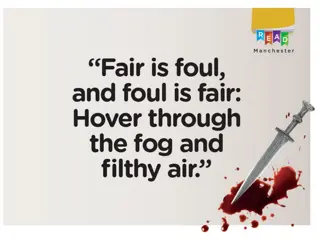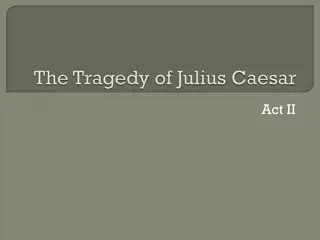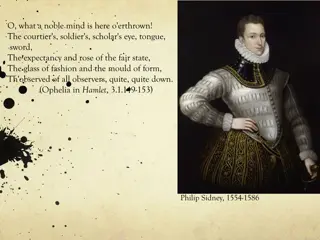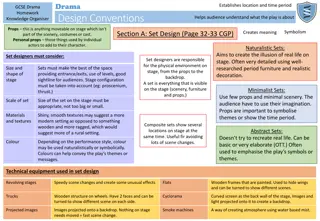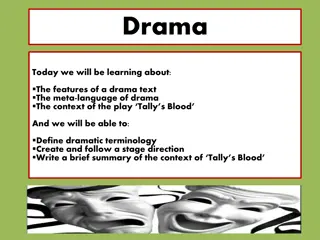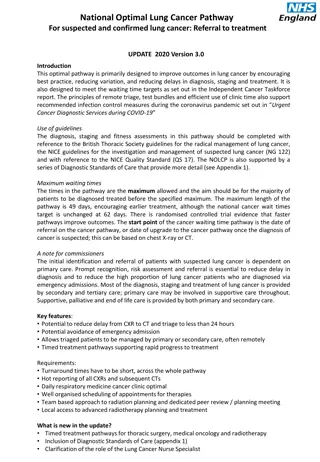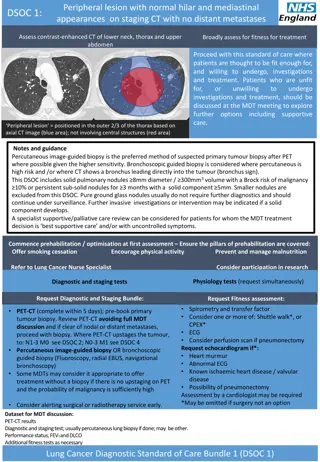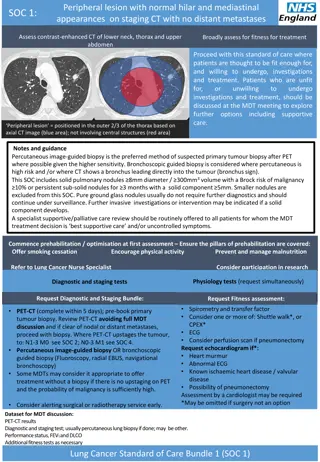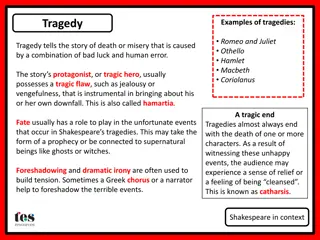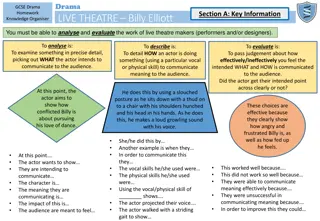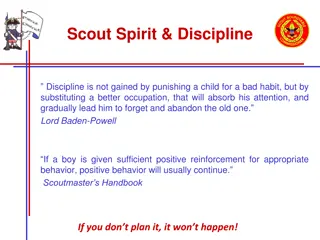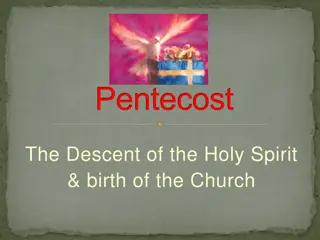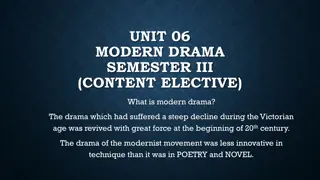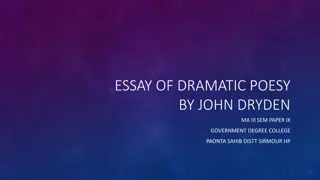Analysis of Staging the Spirit in Shakespearean Drama
Exploring the significance of staging spirits in Elizabethan drama, particularly in Hamlet, sheds light on how Shakespeare cleverly blended Protestant and Catholic viewpoints through characters like Horatio and the ghost. The meeting between Hamlet and his father's spirit marks a pivotal moment in the play, setting the stage for themes of revenge and the supernatural. The scene also serves as a conclusion to Act I, transitioning Hamlet's life towards a path of vengeance.
Download Presentation

Please find below an Image/Link to download the presentation.
The content on the website is provided AS IS for your information and personal use only. It may not be sold, licensed, or shared on other websites without obtaining consent from the author. Download presentation by click this link. If you encounter any issues during the download, it is possible that the publisher has removed the file from their server.
E N D
Presentation Transcript
ACT I SCENE V C Amjed Lateef Jabbar Ph.D. in English Literature Google Classroom (Elizabethan Drama) Class Code (52zj6rj)
OUTLINE Hamlet is alone with the spirit of his father. The ghost reveals the details of his murder at the hands of Hamlet s uncle, Claudius. Hamlet vows revenge. The spirit warns Hamlet not to hurt Gertrude. Horatio and Marcellus enter and find Hamlet a changed man. Hamlet makes the two men swear never to reveal what they have seen.
TIPS FOR ANALYSIS This scene functions as: 1. Aconclusion and a suitable closing toACT I. 2. An ending point to the suspense which started as early as scene I of this act. 3. Yet, it will start another, bigger and more significant suspense. 4. Alittle break from the previous scene. 5. A change to Hamlet s future as his life will be, from now on, dedicated only to revenge.
Staging of Spirits in the Time of Shakespeare: Staging spirits and ghosts in Early Modern theatre required some kind of theatrical device out of which the ghost could emerge and into which he could disappear, which may have been the trapdoor in the stage floor of theatres such as the Globe. Otherwise, the actors would have to move from one part of the stage to another so that the audience could accept the scene change.
The staging of spirits in that time was something so daring because of two reasons which reflect the cleverness of William Shakespeare: 1. A newly Protestant audience would expect a Protestant view-point to be presented onstage. Shakespeare accommodated that expectation by having Hamlet and Horatio study in Wittenberg, a sixteenth-century center of Protestant thought and education with a scholarly respect for reason and a disregard for superstition and myth.
2. But the older Catholic view of hauntings and spirits and the belief in purgatory are integral parts of this scene as well. Therefore, Horatio represents the Protestant notions and brings the voice of scholarly reason from Wittenberg; the ghost symbolizes the Catholic beliefs and echoes the voice of the past.
The First full Meeting between Hamlet and the Ghost of his father: This meeting brings the following events: 1. with a sense of dignity, authority, gentleness, and sadness, the ghost identifies himself to Hamlet by saying, I am thy father s spirit (9). 2. The apparition tells Hamlet that it is condemned to walk the night, it cannot rest until the sins on its soul are burned away. 3. The ghost cannot tell Hamlet what purgatory is like or how the spirit suffers in fire, because mortals cannot understand nor bear the such horrors.
4. Hamlet is now speechless and he wants only to hear what the ghost has come to tell him. He focuses all his attention on the spirit s words. The words mu[r]der and [r]evenge are stressed, and they resound against Hamlet s ears like physical blows (25). 5. The spirit tells the story of his death. He was not stung by a serpent as everyone had been led to believe; instead he was poisoned by Claudius.
Hamlets mission Hearing what the ghost told him, now Hamlet has a triple-fold mission which is that he must now: 1. Seek revenge for his father s murder because Claudius killed Hamlet s father. 2. Seek revenge for his father s shame because Claudius married Hamlet s mother. 3. Bringing back the social harmony and hierarchy that was disturbed by Claudius in killing the king. His father was the king, and the death of a king upsets the balance of the state. The unnatural demise of King Hamlet bodes evil for an entire society. Hamlet reminds himself that the world, the universe itself , must be set right.
Q. Hamlets father was a good king and good husband, then why is he sent to Purgatory not to Paradise? The ghost cries that he was sent to his afterlife without a chance to confess and do penance for his sins, With all my imperfections on my head (79). According to the Catholic belief, without absolution (which is called the Last Rites), the soul of a person is marked with sin and must stay in purgatory until the sins are removed.
The Second soliloquy of Hamlet: It is filled with fear, excitement, and resolution. Hamlet now knows that the hatred he has felt towards his uncle has not been unfair or misplaced. Hamlet has no trouble promising his father that this one thing, revenge, which will now occupy him solely. He calls on the entire universe to bear witness to his vow and struggles to maintain composure. He condemns Claudius for having placed the burden of revenge upon him. He refers to his mother as that pernicious woman and Claudius as that smiling, damned villain (105, 106). He bids farewell to his father s ghost and swears that his murder will not go unpunished.
Hamlets plan 1. Hamlet starts to act strangely and to utter strange, playful words. He acts silly, answering the concerned questions of Horatio and Marcellus with witty puns and joking replies, like Hillo, ho, ho (115). 2. As for the appearance of the ghost, Hamlet tells the men (Horatio and Marcellus) hat the event must remain a secret. He insists that they never reveal what they have seen no matter what happens. 3. Hamlet brings the men together to swear their silence. They hesitate. The ghost is watching and its voice tells them three times to Swear . Then, the men quickly comply and swear to silence on Hamlet s sword. (Historical Allusion to the idea of Comradeship taken from the Vikings).
The beginning of Hamlets Procrastination and Hesitation 1. Hamlet has no trouble promising the ghost that he will carry out his wishes of revenge; but remember, Hamlet is passionate and impulsive. But he is also thoughtful, and in the next day, revenge will not come easily to him. 2. Despite that Hamlet promised the ghost of his father to accomplish revenge, yet still, the mission of revenge is something he takes no pleasure in. At first he seemed almost anxious to kill his uncle, but by the end of the scene he considers his task in more serious terms. He knows that his job is immense.



